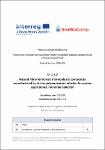Natural fibre-reinforced thermoplastic composites manufactured by in-situ polymerisation infusion for marine applications: monomer selection
| dc.contributor.author | Qin, Y | |
| dc.contributor.author | Summerscales, John | |
| dc.contributor.author | Cullen, R | |
| dc.contributor.author | Graham-Jones, Jasper | |
| dc.contributor.author | Meng, M | |
| dc.contributor.author | Pemberton, R | |
| dc.contributor.other | InterReg 2 Seas | |
| dc.date.accessioned | 2023-05-05T14:11:59Z | |
| dc.date.available | 2023-05-05T14:11:59Z | |
| dc.date.issued | 2019-11-11 | |
| dc.identifier.other | SeaBioComp D1.1.3 | |
| dc.identifier.uri | https://pearl.plymouth.ac.uk/handle/10026.1/20844 | |
| dc.description.abstract |
Due to the greater awareness of the environmental issues, composite researchers are increasingly interested in using “greener” materials to substitute for synthetic fibre reinforcements and petrochemical polymer matrices. Therefore, in order to minimise the ecological impact, the SeaBioComp project aims to produce natural fibre bio-based thermoplastic composites for marine applications. It is clear that the selection of the resin system will significantly affect the cost, manufacturing process, mechanical properties and durability of the chosen composite material system. This report reviews the available thermoplastic monomers suitable for in-situ polymerisation during monomer infusion under flexible tooling (MIFT); and then discusses criteria for the selection of appropriate monomers based on monomer processing temperature and viscosity, polymer mechanical properties, recyclability, etc. Given the systems currently available, polymethyl methacrylate (PMMA) Elium® thermoplastic resin could be the most suitable resin/monomer for the composite production in this project. It has low processing temperature, long open window for infusion, and low moisture absorption but end-of-life recovery may be an issue. The research literature suggests that bio-based methyl methacrylate (MMA) may become available during the SeaBioComp project. Special attention is required for the recycling technology; a life cycle analysis should be performed. Polylactide (PLA) may be an alternative to Elium® as the infusible monomer, but the relatively high processing temperature may require expensive consumable materials, and there may be durability issues. | |
| dc.title | Natural fibre-reinforced thermoplastic composites manufactured by in-situ polymerisation infusion for marine applications: monomer selection | |
| dc.type | report | |
| plymouth.confidential | false | |
| plymouth.organisational-group | |Plymouth | |
| plymouth.organisational-group | |Plymouth|Research Groups | |
| plymouth.organisational-group | |Plymouth|Faculty of Science and Engineering | |
| plymouth.organisational-group | |Plymouth|Faculty of Science and Engineering|School of Engineering, Computing and Mathematics | |
| plymouth.organisational-group | |Plymouth|Research Groups|Marine Institute | |
| plymouth.organisational-group | |Plymouth|REF 2021 Researchers by UoA | |
| plymouth.organisational-group | |Plymouth|Users by role | |
| plymouth.organisational-group | |Plymouth|Users by role|Academics | |
| plymouth.organisational-group | |Plymouth|REF 2021 Researchers by UoA|UoA12 Engineering | |
| plymouth.organisational-group | |Plymouth|REF 2021 Researchers by UoA|UoA12 Engineering|UoA12 Engineering MANUAL | |
| dc.date.updated | 2023-05-05T14:11:58Z |


